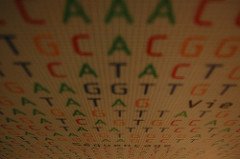Ancestry Tests Pose a Threat to Our Social Fabric
By John Edward Terrell,
Sapiens
| 08. 23. 2018
I have never understood why anybody would think humans are by nature violent, warlike creatures. True, we have all surely had arguments turn sour and go off the rails—arguments sometimes so extreme, or even deadly, that we later wish we could take back what we have said and undo what has happened. So yes, we humans do have the physical and emotional capacity to be nasty and even violent creatures when we feel threatened or frightened. Yet if there is anything about being human written in our genes by evolution, it’s not that we are dangerous animals. Instead, it’s that we are one of Earth’s strongly social life forms. Some of us may not be as social as others. Yet most of us know that the words “gosh, I need a hug” are about more than just a sudden call for physical contact. Most of us not only want to be around others, we also need to be. That’s just being human.
If I am right that our kind of animal not only likes but needs to feel connected...
Related Articles
By Diaa Hadid and Shweta Desai, NPR | 01.29.2026
MUMBRA, India — The afternoon sun shines on the woman in a commuter-town café, highlighting her almond-shaped eyes and pale skin, a look often sought after by couples who need an egg to have a baby.
"I have good eggs,"...
By George Janes, BioNews | 01.12.2026
A heart attack patient has become the first person to be treated in a clinical trial of an experimental gene therapy, which aims to strengthen blood vessels after coronary bypass surgery.
Coronary artery bypass surgery is performed to treat...
By Staff, ScienceDaily | 01.05.2026
Scientists at UNSW Sydney have developed a new form of CRISPR technology that could make gene therapy safer while also resolving a decades-long debate about how genes are switched off. The research shows that small chemical markers attached to DNA
...
Following a long-standing CGS tradition, we present a selection of our favorite Biopolitical Times posts of the past year.
In 2025, we published up to four posts every month, written by 12 authors (staff, consultants and allies), some in collaboration and one simply credited to CGS.
These titles are presented in chronological order, except for three In Memoriam notices, which follow. Many more posts that are worth your time can be found in the archive. Scroll down and “VIEW...




